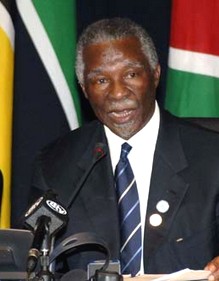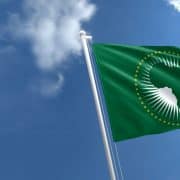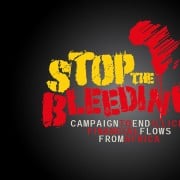|
Getting your Trinity Audio player ready...
|
 Former president Thabo Mbeki chairs the African Union’s high level panel on illicit financial flows (IFFs). He addressed the Pan-African Parliament last week on the excessive cost to Africa of these illegal activities. Read Mbeki’s full speech below.
Former president Thabo Mbeki chairs the African Union’s high level panel on illicit financial flows (IFFs). He addressed the Pan-African Parliament last week on the excessive cost to Africa of these illegal activities. Read Mbeki’s full speech below.
Honourable President and Vice Presidents of the Pan African Parliament,
Honourable Members,
Ladies and Gentlemen:
I would like to thank you for inviting me to share some thoughts with you about illicit outflows of capital from Africa.
In 2011, the African ministers of finance, planning and economic development, jointly convened by the African Union and the UN Economic Commission for Africa, identified these illicit capital outflows as constituting a major obstacle to our development efforts.
Accordingly they decided to form a high level panel to investigate and make recommendations about what Africa should do to stop these illicit financial outflows.
The panel, which I had the privilege to chair, started its work in 2012 and submitted its report to the 24th Ordinary Session of the Assembly of African Union Heads of State and Government this January. The assembly adopted the report and its recommendations.
By way of background, it is estimated that over the last 50 years, Africa lost in excess of US$1-trillion in illicit financial outflows.
Our panel further estimated that our continent loses annually over $50-billion through these illicit financial outflows.
This estimate is based on data obtained from the International Monetary Fund Direction of Trade Statistics which, as Raymond Baker, director of Global Financial Integrity explains, reports annual exports and imports for all reporting countries.
The figure of $50-billion is therefore an underestimate as it excludes such elements as trade in services and intangibles, proceeds of bribery and trafficking in drugs, people and firearms.
As we have said, the African ministers decided to investigate the matter of illicit financial outflows because of the immense developmental challenges which face the continent.
For us to meet these challenges requires huge volumes of capital. Accordingly it does not make any sense that we should be exporting capital which should be retained within our continent.
MDGs hampered by illicit financial flows
You will recall that later this year, the Millennium Development Goals, the MDGs adopted in the year 2000, will be replaced by the new Sustainable Development Goals. In this regard you know that many of our African countries did not achieve all these MDGs because of insufficient capital to finance the required actions.
You will also recall that to address this challenge of generating the resources to enable all countries to realise the MDGs, in 2002 the UN convened the International Conference on Financing for Development.
As you know, the next International Conference on Financing for Development will be held in Addis Ababa in July this year. It is clear that this time round the conference will pay particular attention to the matter of domestic resource mobilisation to finance the new development goals.
Indeed in its declaration on illicit financial flows, the AU Assembly has expressed “the need to ensure that illicit financial flows and their impact on domestic resources mobilisation is given the necessary attention by the 3rd International Conference on Financing for Development, and in this regard, stress(es) the need for robust international cooperation to address the problem”.
It is therefore obvious that particular attention will be paid to the issue of stemming the illicit financial outflows throughout the developing world. This will put pressure on all of us to act on this matter.
In this context we should take particular note of the observation made by the AU Assembly in its declaration of illicit financial flows concerning “the growing need for domestic resource mobilisation for the attainment of our continental development visions and goals particularly Agenda 2063 and the common African position on the post 2015 development agenda, which both call for inclusive growth, sustainable development and social and economic structural transformation of Africa through optimal utilisation of our natural resource endowments…”
In the context of everything I have said, it is necessary to keep in mind various specifics of our situation as Africans. The UN has estimated that the number of Africans living on less than $1.25 a day increased from 290-million in 1990 to 414-million in 2010. In addition, per capita GDP in Africa is one fifth, that is, 20% of the global average figure.
In 2012 the gross capital formation rates in Nigeria and South Africa were 13% and 19% respectively. The related figures for China and India respectively were 49% and 35%.
And yet the African Development Bank and others estimate that Africa needs an additional $30- to $50-billion annually to address its infrastructure needs.
These statistics make the unequivocal statement that Africa needs large volumes of capital effectively to address the challenge of the eradication of poverty and underdevelopment.
It is precisely in this context that the imperative stands out that everything should be done to stop the illicit financial outflows which contribute so much to depleting the capital our continent so urgently needs.
Preventing capital outflows
Accordingly, to indicate what needs to be done, our panel on illicit financial flows adopted the self-explanatory action slogan: Track it! Stop it! Get it!
Of central importance in this regard is the finding our panel made that the bulk of illicit financial flows from our continent – 60% and more – derives from the activities of the large commercial companies.
The second and third sources of these illicit outflows respectively are through criminal activities such as drug trafficking accounting for about 30%, and lastly, corruption.
With regard to the latter we must explain that here corruption features in two contexts. One of these which we have just mentioned is the expatriation of corruptly acquired resources.
The other is corruption understood as the abuse of entrusted power to facilitate the illicit export of capital by others and therefore its prevalence throughout the various activities which represent the illicit outflows.
The second important finding I must mention is that the outflows from Africa end up somewhere else in the world. Accordingly to stem these outflows requires co-operation and joint action among the originating and receiving countries.
Financial secrecy is a problem
I would like to make two observations in this regard.
One of these is that the various tax havens and financial secrecy jurisdictions in Africa and elsewhere in the world are at the centre of the problem of illicit financial outflows since they are among the major receiving countries for these outflows.
This calls for concerted international action to address this challenge since it is clear that transparency in terms of financial transactions is indeed key to achieving success in the fight against the illicit outflows.
Our second observation is that as yet there is no global architecture to ensure the required concerted global action to combat the illicit financial outflows.
In this regard, even as our panel says that “there are a number of commendable initiatives and instruments (which it lists), to deal with the commercial, criminal and corrupt activities of IFFs”, which it says are nevertheless “disparate and handled in separate processes and forums”, it suggests that it would be best that the matter of illicit financial flows is dealt with comprehensively under the auspices of the UN.
Yet another important finding of our panel is that many of the African countries lack the capacity to combat the illicit financial flows and makes various recommendations in this regard.
Another finding we must mention relates to the matter of the unwise use of tax incentives to attract foreign direct investment. In this regard the panel stated that “in many instances these policy decisions (to grant tax incentives) are not guided by proper cost-benefit analyses but rather by the intention of outdoing competitors for foreign direct investment, leading to harmful tax competition and a “race to the bottom”.
Corruption facilitates illegal outflows
The second last finding we would like to mention concerns the important matter of corruption. In this regard the panel said:
“Corruption remains a matter of major concern despite the global and regional attention that resulted in the adoption of the UN Convention against Corruption and the African Union Convention on Preventing and Combatting Corruption.
Corruption is a cross-cutting and integral part of IFFs because of its facilitating role … Corruption in the form of abuse of entrusted power for private benefit in both the public and private sectors thus remains an issue of continuing concern.”
The last finding we would like to mention relates to the need to expedite the processes of asset recovery and repatriation. In this regard the panel drew attention to the importance of the UN and AU Conventions against corruption which we have just mentioned, as well as the Stolen Assets Recovery Initiative, which is a partnership between the World Bank and the UN Office on Drugs and Crime, and the Asset Recovery Inter-Agency Network of Southern Africa.
With your permission, I would like to elaborate a little more on some of the panel findings I have mentioned by quoting some paragraphs from the panel report.
These will relate to the matter of the corporations, tax incentives and the issue of the capacity of our countries to fight against the illicit financial flows.
Illicit outflows emanating mainly from the commercial sector
The panel report says: “The commercial sector is the major source of illicit financial outflows in Africa, but it is the least understood. This is due to the range of methods by which IFFs take place in the commercial sector as well as the technicality of issues such as transfer pricing, tax evasion, aggressive tax avoidance, trade misinvoicing, tax incentives, double-taxation agreements and the like.
“Although the OECD is working to address issues of base erosion and profit shifting, this work is not principally geared to developing country concerns. African governments are concerned about the negative impact of these illicit financial outflows on their tax revenues and investment capital, but most of them lack legislation and guidelines on transfer pricing or effective units to address the problem.
“African countries need to pay closer attention to illicit flows from the commercial sector. This means developing the required capacities, establishing or strengthening necessary institutions including transfer pricing units, and providing resources for the effective functioning of these institutions. It would also mean holding multinationals accountable for fraudulent practices by setting up requirements for their transfer of funds and business practices.”
With regard to the matter of tax incentives, the report says: “There is a clear need to undertake cost-benefit analysis in granting tax incentives, especially tax holidays intended to attract foreign direct investment. Moreover, there should be co-ordination of such incentives among regional economic communities to develop common standards and prevent a ‘race to the bottom’.
“For tax holidays, rules should be drawn up to prevent the same entity/beneficial owner from continuing to benefit after there is an apparently substantial change in ownership.”
Not enough capacity to address the problem
Concerning the issue of capacity, the report states that: “The ability of African countries to combat IFFs is seriously impeded by deficiencies in their capacities to track, stop and repatriate illicit financial outflows.
“This lack of capacity is reflected at various levels, such as the lack of accurate data and up-to-date information, inadequate understanding of the various mechanisms used, and absent or ineffective legislative, regulatory and institutional frameworks.
“Most African countries do not have enough highly trained lawyers, accountants and tax experts to carry out the oversight functions to prevent or punish perpetrators of illicit financial outflows. The few that exist are often overworked and unable to prepare sufficiently to take on top-class professionals representing large corporations.
“Illicit financial outflows from Africa can be reduced and stemmed only by enhancing and improving relevant capacities across the board. This requires a dedicated and up-scaled effort to provide resources. It means providing money to create relevant agencies, such as revenue authorities, transfer pricing units, customs services, anti-corruption agencies, financial intelligence units and the like, where these do not exist.
“It also means strengthening existing institutions by giving them the necessary autonomy and tools with which to carry out their duties. It further means recruiting and training top-flight personnel and making efforts to retain them in the public sector. Regional efforts are also needed, including through forums such as the African Tax Administration Forum and related mutual assistance programmes.
“The support of the global community is also essential to make up for current capacity deficiencies. The idea of Tax Inspectors Without Borders is a good example of how such support could be rendered.”
Detailed work is called for
I have just quoted some paragraphs which relate to only three out of the 15 findings in the panel report.
Nevertheless these paragraphs are sufficient to indicate the extent of the detailed work we as Africans have to do effectively to arrest the illicit capital outflows from our continent.
I would therefore urge that you study the report of the panel the better to empower yourselves correctly to determine what you should do as the elected representatives of our people to help implement the recommendations of the panel.
Further, we would also suggest that you study the important AU Assembly declaration on illicit financial flows, especially the actions that should be taken to stem these outflows.
As an example, the assembly resolved to “request the (AU) Commission, Economic Commission for Africa, African Development Bank, African Capacity Building Foundation and other development partners to build capacities of African Union member states and institutions, particularly in contract negotiation, tax management, regulatory and legal frameworks, …, money laundering, asset recovery and repatriation, and resource governance for effective and optimal management and governance of our natural resources.”
It also urged that “carrying out (of) advocacy work to disseminate the panel’s findings and to galvanise support from a broad coalition of partners including civil society and the private sector to implement the panel’s recommendations…”
Obviously the Pan-African Parliament will have to define its specific role and the practical work it will do to implement these and the other actions to help ensure that that we stem and stop the illicit capital outflows which impact so negatively on the continental development efforts.
I would like to conclude by quoting yet another paragraph from the declaration of the AU Assembly.
Our heads of state and government said they are “aware that the problem of illicit financial flows is exacerbated by corrupt tendencies of government agencies, lack of or weak African institutions both at national and continental levels in all sectors, governance challenges, political instability and conflicts, weak tax administration, and lack of capacity to monitor and curb such criminal activities among others…”
I think this further clarifies the areas on which you as our elected representatives need to focus to retain within our continent the valuable resources that will help us to achieve the better lives for the billion Africans to which all of us are committed.
We are confident that the Pan-African Parliament will indeed respond energetically to the call – Track it! Stop it! Get it!
Thank you very much for your attention.









